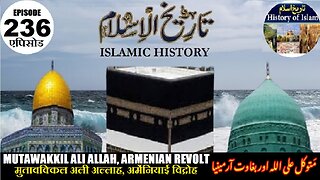Premium Only Content

Allah Almighty Covenant with the Prophets अल्लाह सर्वशक्तिमान वाचाانبیاء کے ساتھ اللہ تعالی کا عہد
@islamichistory813 #healing #and #events #from #the #quran #historical #stories #and #events #quranicstories #selfhealing #success #stories #striking #events #in #history #quranstories, #storiesfromthequran #religious #creation #stories #trending #quran #short #historical #loves #historical #heroes #what #is #true #strength #calm #quran #recitation #for #babies #islamic #healing
Allah Almighty Covenant with the Prophets
Brothers, sisters, friends and elders Assalamu Alaikum, wa Rahmatullahi wa Barakatuhu, we are presenting the 74th episode of the Islamic informative video based on healing and events from the Holy Quran, and in this video we will describe, Allah Almighty Covenant with the Prophets
Verses 4:163–165 of the Qur’an emphasize the profound truth that divine revelation has always been part of humanity’s journey through the messengers and prophets chosen by Allah. These verses serve as a powerful reminder that Islam is not a new religion but the continuation and culmination of a long, consistent line of monotheistic teachings that began with earlier prophets. In these passages, Allah reaffirms that He has revealed His will to a long list of messengers—including Noah, Abraham, Moses, Jesus, and many others—thereby establishing a continuous and unbroken covenant of guidance between the Creator and humankind. This affirmation of previous prophets not only bridges Islam with the messages of Judaism and Christianity but also reinforces the universality and timelessness of divine instruction.
Verse 4:163 begins by stating: **“Indeed, We have revealed to you \[O Muhammad], as We revealed to Noah and the prophets after him. And We revealed to Abraham, Ishmael, Isaac, Jacob, the Descendants, Jesus, Job, Jonah, Aaron, and Solomon, and to David We gave the Psalms.”** This verse makes it clear that Prophet Muhammad ? is part of a broader prophetic tradition, not an isolated figure or founder of a new belief system. The mention of Noah at the beginning signifies the early point in human history when divine communication began after the corruption of humankind. From there, the verse includes patriarchs such as Abraham and his descendants, who are central to the Abrahamic faiths. These names reflect a cross-section of humanity and various regions, showing that God’s message was never limited to one people or nation.
The list of prophets also serves to validate their status as true messengers of God and to remind the audience of the shared foundations of their teachings. Each prophet was given a specific message suitable for their time and people, but the essence of their calls—belief in one God, righteousness, justice, and compassion—remained consistent. This uniformity underscores the concept of *Tawheed* (oneness of God) as a central pillar across all divine messages. The inclusion of Jesus (??s?) alongside Moses (M?s?) and David (D?w?d), with special mention of the Psalms (Zabur) given to David, affirms the legitimacy of earlier scriptures and prophets while also implicitly correcting any distortions or exaggerations that emerged over time.
In verse 4:164, the Qur’an states: **“And \[We sent] messengers We have mentioned to you before and messengers We have not mentioned to you. And Allah spoke to Moses with \[direct] speech.”** This verse reinforces the idea that the number of prophets is far greater than those explicitly named in the Qur’an. It broadens the horizon of revelation, implying that divine guidance has reached many peoples and nations throughout history, even if their stories are not fully recorded. The special note that Allah spoke directly to Moses (M?s?) is a recognition of his elevated status and the intimacy of his communication with God. This mirrors biblical accounts of Moses’s unique prophetic experience and highlights his importance in the Islamic tradition as one of the five greatest messengers, known as *Ulul ‘Azm* (those of firm resolve), along with Noah, Abraham, Jesus, and Muhammad.
Verse 4:165 concludes this section by stating: **“\[We sent] messengers as bringers of good tidings and warners so that mankind will have no argument against Allah after the messengers. And ever is Allah Exalted in Might and Wise.”** This verse highlights the purpose of sending prophets: to deliver both glad tidings for those who follow truth and warnings for those who reject it. The role of the messengers is not merely to preach but to serve as living examples of God’s will in action. Their presence removes any excuse people might have on the Day of Judgment, for they were given the opportunity to receive guidance through human intermediaries who conveyed divine words. Thus, the responsibility of responding to revelation lies squarely with humankind after the truth has been made known.
The end of the verse emphasizes two of Allah’s attributes: **Al-‘Aziz** (The Exalted in Might) and **Al-Hakim** (The Wise). These names serve to remind the reader that God’s choice of prophets, the timing of revelations, and the way guidance is dispensed all stem from His perfect wisdom and power. There is nothing arbitrary or unjust in divine planning—every messenger was chosen at the right time for the right people with a message that aligned with universal truth.
These verses also carry profound implications for interfaith understanding. By acknowledging the prophets revered in Judaism and Christianity, Islam encourages mutual respect among the Abrahamic faiths. At the same time, the Qur’an positions itself as the final and most complete revelation, with Prophet Muhammad ? as the Seal of the Prophets, sent not to replace but to confirm and finalize what came before. The divine covenant is thus a continuous thread that unites humanity in its spiritual purpose: to know, worship, and live according to the will of one Creator.
In conclusion, verses 4:163–165 establish the Qur’anic view of prophethood as a divinely orchestrated sequence of revelations aimed at guiding humanity throughout history. The mention of numerous prophets, the special status of Moses, and the inclusive acknowledgment of unnamed messengers all affirm the universality of God's message. These verses remind believers that the essence of all prophetic teachings is one, and that the responsibility to follow this guidance lies with each generation. Through these revelations, Allah affirms His ongoing mercy, wisdom, and justice in providing humanity with the light of truth across time.
With this, we ask for your permission until tomorrow and pray to Allah Almighty to grant us the ability to act on the Quran and Hadith, Amen
Allah Hafiz
============================
-
 9:58
9:58
ISLAMIC HISTORY
21 hours agoIslamic History Episode 236 Mutawakkil Ali Allah, Armenian Revolt متوکل علی اللہ ، بغاوت آرمینیا
8 -
 LIVE
LIVE
BEK TV
22 hours agoTrent Loos in the Morning - 9/25/2025
290 watching -
 2:39
2:39
The Official Steve Harvey
1 day ago $0.05 earnedThese books didn’t just change my mind, they changed my life. 📚💯
471 -
 1:35:35
1:35:35
Investigate Everything w/ Brian O'Shea
13 hours agoPart 1: "Evil & Logistics: Why is the Left So Good At Both” w/ Brian O’Shea & Bill Stebbins
405 -
 1:20:31
1:20:31
CharLee Simons presents DO NOT TALK
1 day agoR.I.P. MEDIA FREAKS
841 -
 16:39
16:39
Professor Nez
18 hours ago🚨PRICELESS: Trump Just EMBARRASSED Macron in New York
43.5K19 -
 25:51
25:51
DeVory Darkins
17 hours ago $5.42 earnedDemocrats ghosted and stunned by Trump as Routh attempts to off himself after guilty verdict
15.3K59 -
 21:15
21:15
Actual Justice Warrior
15 hours agoJimmy Kimmel DECLARES Victory
31.2K40 -
 49:42
49:42
Liz Wheeler
17 hours agoWHO is Behind ANTIFA? | Ep 176
36.7K22 -
 8:30
8:30
MattMorseTV
17 hours ago $9.21 earnedThis just ENDED Newsom's CAREER.
164K65